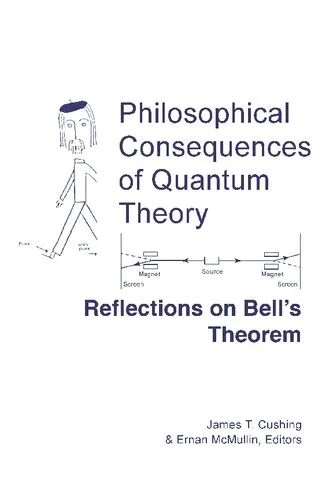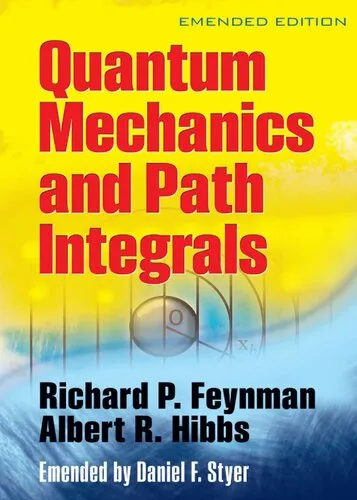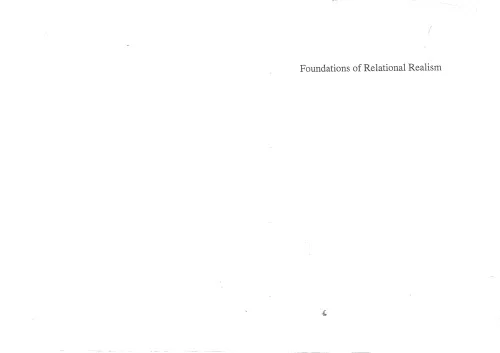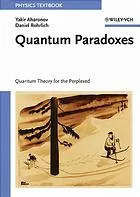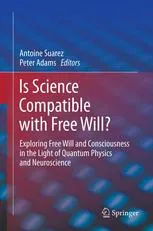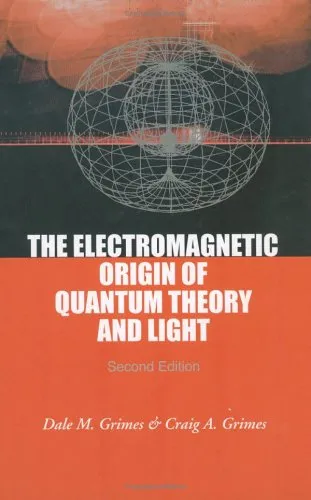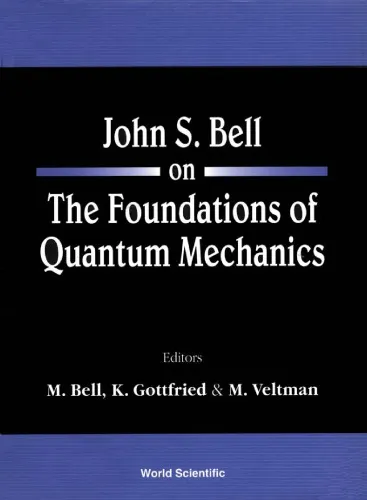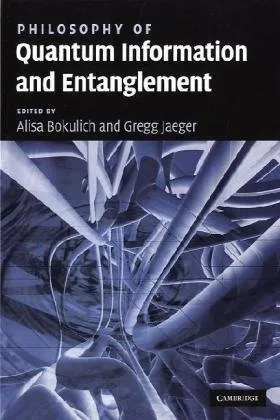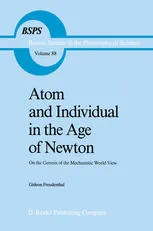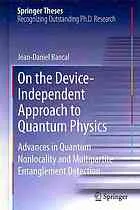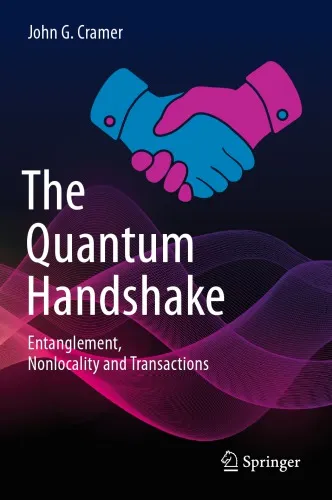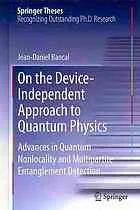Philosophical Consequences of Quantum Theory: Reflections on Bell's Theorem
4.5
بر اساس نظر کاربران

شما میتونید سوالاتتون در باره کتاب رو از هوش مصنوعیش بعد از ورود بپرسید
هر دانلود یا پرسش از هوش مصنوعی 2 امتیاز لازم دارد، برای بدست آوردن امتیاز رایگان، به صفحه ی راهنمای امتیازات سر بزنید و یک سری کار ارزشمند انجام بدینکتاب های مرتبط:
معرفی کتاب
کتاب "Philosophical Consequences of Quantum Theory: Reflections on Bell's Theorem" نوشته جیمز تی. کوشینگ و ارنان مکمولین به بررسی عمیق و فلسفی نظریه کوانتوم و پیامدهای فلسفی نیاز آوردن بر آن با محوریت Bell's Theorem میپردازد. این کتاب مقصدی معتبر برای کسانی است که به کاوش در تلاقیش علم و فلسفه علاقهمندند و میخواهند تا پیچیدگیهای نظریه کوانتوم را بهتر درک کنند.
خلاصهای از کتاب
کتاب از چندین مقاله تشکیل شده است که همه به نحوی بر اهمیت نظریه زنگوله (Bell's Theorem) تمرکز دارند. این مقالات سعی میکنند تا به سوالات بنیادی درباره طبیعت واقعیت، عینیت علمی و نقش مشاهدهگر در نظریه کوانتوم پاسخ دهند و تنشهایی که بین مکانیسمهای محلی و مکانیک کوانتومی وجود دارد را برجسته کنند. نویسندگان با بررسی دقیق کارهای جان بل، مباحث مختلفی را در این زمینه روشن میسازند.
نکات کلیدی
- تفاوتهای اساسی بین تفسیرهای مختلف از مکانیک کوانتومی و تأثیرات آنها بر فلسفه علم.
- بررسی دقیق Bell's Theorem و تفاوت آن با دیگر نظریههای مربوطه در فیزیک کوانتوم.
- تأثیرات فلسفی باعثشده از تأیید پذیرفتن نظریات Bell بر حوزههای مختلف فکری و علمی.
- نقش احتمال و عدم تعین در نظریه کوانتومی و پیامدهای آن برای فلسفههای واقعیت.
نقلقولهای معروف از کتاب
«نظریه Bell چراغی بر تاریکیهای تفکرات عمیق علمی افروخته و مسیرهایی جدید در تفسیر و استفاده از دادههای تجربی ارائه کرده است.»
«واقعیت چیزی بیش از آنچه میپنداریم نیست؛ اما آنچه میپنداریم شاید چیزی نباشد که واقعا هست.»
چرا این کتاب مهم است
این کتاب درک عمیق تری از چگونگی تقابل مکانیک کوانتومی و فلسفه را ارائه میدهد و تأثیر عمیقی بر خوانندگان میگذارد که به دنبال فهم کاملتر مفهوم واقعیت و علم هستند. فلسفه و علم، همواره در تعامل نزدیک با یکدیگر بودهاند و این اثر، نمونه بارز آن است که درک ما از این ارتباط را تحکیم میبخشد. مهمترین نکته این کتاب، ارائه سوالات جدیدی است که موجب میشود خوانندگان به تفکر بیشتر واداشته شوند و پژوهشهای بیشتری در این زمینه انجام دهند.
Welcome to the comprehensive introduction of Philosophical Consequences of Quantum Theory: Reflections on Bell's Theorem, a profound exploration of one of the most intriguing and challenging areas of modern physics and philosophy. This book, co-authored by James T. Cushing and Ernan McMullin, delves into the philosophical implications of Bell's Theorem, providing an in-depth analysis that is invaluable for both physicists and philosophers alike.
Detailed Summary of the Book
In "Philosophical Consequences of Quantum Theory: Reflections on Bell's Theorem", Cushing and McMullin engage readers with a robust examination of Bell's Theorem—an essential milestone in the discussion about locality and realism in quantum mechanics. This theorem proposed by physicist John S. Bell challenges the fundamental notions of local realism, suggesting that either locality or realism must be relinquished in the context of quantum phenomena. The book offers a collection of essays and reflections by leading scholars in the field, presenting diverse viewpoints on the philosophical and scientific implications that arise from the theorem.
Throughout the book, readers are introduced to critical discussions about the nature of reality, the limits of human knowledge, and the philosophical ramifications of quantum entanglement. Sections of the book range from a detailed explanation of Bell’s theorem itself, considerations of its consequences on our understanding of reality, to speculative discussions on the future directions of quantum theory and its philosophical implications. The introduction of non-locality and the challenge to classical intuitions about the separability of distant objects underscore the profound impact that quantum theory has on the philosophy of science.
Key Takeaways
- Bell's Theorem poses significant challenges to the concept of local realism, which has implications for how we understand the nature of reality and causation.
- The interconnectedness of quantum systems calls into question the conventional division between observer and observed, suggesting a holistic understanding of the universe.
- The book explores the interpretative flexibility of quantum mechanics, highlighting the need for philosophical reflection in scientific discourse.
- By gathering perspectives from various philosophers and physicists, the book underscores the interdisciplinary approach necessary for grappling with complex scientific theories.
Famous Quotes from the Book
"To understand quantum mechanics, we must expand our philosophical inquiry beyond the bounds set by classical intuitions."
"One of the remarkable features of Bell's Theorem is its ability to reframe fundamental questions about the universe as questions about the information available to us."
Why This Book Matters
“Philosophical Consequences of Quantum Theory” is more than a scholarly treatise; it is a crucial bridge between the empirical and the speculative, encouraging an ongoing dialogue between scientific findings and philosophical thought. In an era where quantum computing and other technologies emerging from quantum mechanics are reshaping the fabric of modern life, understanding the philosophical underpinnings of these ideas is essential.
This book's importance lies in its ability to provide clarity and provoke thought in the often-convoluted conversation surrounding quantum mechanics. It addresses the deep-seated questions about reality and measurement that remain at the forefront of scientific and philosophical inquiry. By examining the implications of Bell's Theorem, Cushing and McMullin do not just contribute to the academic discourse but also provide insights that have the potential to influence future scientific endeavors and technological advancements.
Beyond the confines of academia, the conversations and reflections in this collection have bearing on broader philosophical considerations pertinent to epistemology, metaphysics, and the philosophy of science, making it essential reading for anyone interested in the deeper questions of existence and the nature of knowledge.
دانلود رایگان مستقیم
شما میتونید سوالاتتون در باره کتاب رو از هوش مصنوعیش بعد از ورود بپرسید
دسترسی به کتابها از طریق پلتفرمهای قانونی و کتابخانههای عمومی نه تنها از حقوق نویسندگان و ناشران حمایت میکند، بلکه به پایداری فرهنگ کتابخوانی نیز کمک میرساند. پیش از دانلود، لحظهای به بررسی این گزینهها فکر کنید.
این کتاب رو در پلتفرم های دیگه ببینید
WorldCat به شما کمک میکنه تا کتاب ها رو در کتابخانه های سراسر دنیا پیدا کنید
امتیازها، نظرات تخصصی و صحبت ها درباره کتاب را در Goodreads ببینید
کتابهای کمیاب یا دست دوم را در AbeBooks پیدا کنید و بخرید
1564
بازدید4.5
امتیاز0
نظر98%
رضایتنظرات:
4.5
بر اساس 0 نظر کاربران
Questions & Answers
Ask questions about this book or help others by answering
No questions yet. Be the first to ask!
